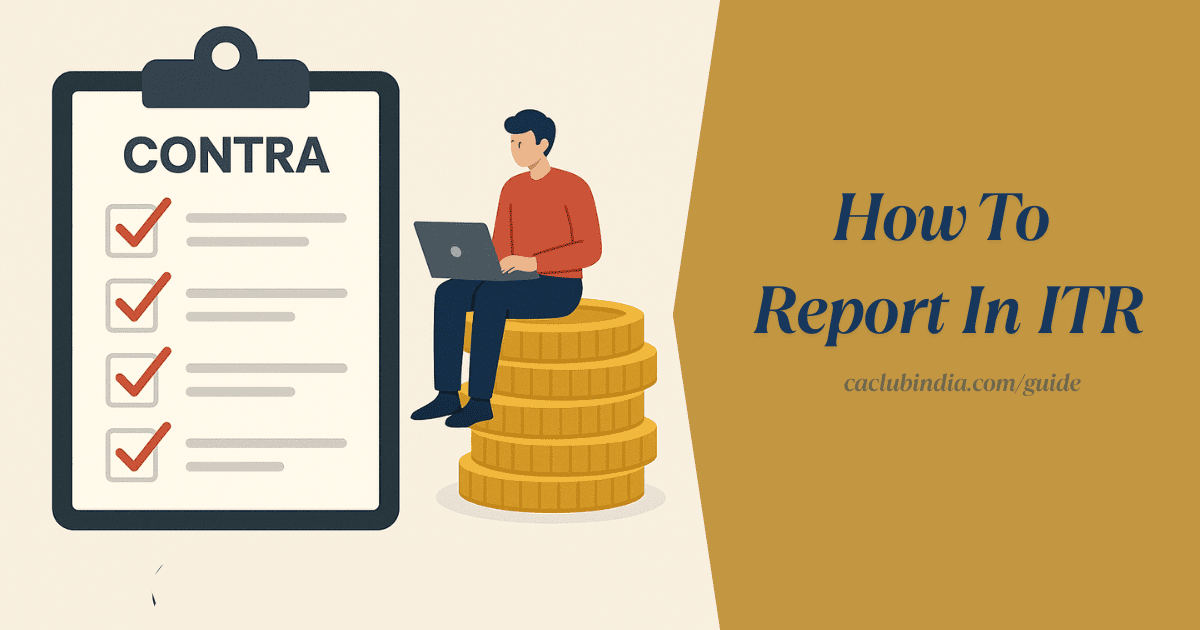Self contra entries refer to transferring your own money from one bank account to another account. This includes transfers between:
- Savings bank accounts
- Current account to savings account
- Post office account to savings account
- Demat account transfers
- UPI transactions to savings accounts
- Digital wallet to savings accounts
- Online gaming app withdrawals
- Cash back or reward
- Automatic transfer of funds from fixed deposit back into a linked saving account when the saving account falls below a predetermined threshold. It’s like Auto-Sweep Facility.
Is it Mandatory to File ITR due Contra Entry?
Yes, it becomes mandatory when the aggregate deposits in one or more savings bank accounts during a financial year exceeds Rs.50 lakh, you must report them in ITR, even if your income is below the basic exemption limit.This applies to:
- Credit side entries only (deposits, not withdrawals)
- Single or multiple savings bank accounts combined
- All types of individuals including senior citizens, super senior citizens and specified senior citizens.
Mandatory ITR Under Section 139(1) Seventh Proviso
Section 139(1) Seventh Proviso of the Income Tax Act specifies various conditions requiring mandatory ITR filing even if income is below basic exemption limits.
Where to Report in ITR ?
Step 1: In the questionnaire at the start of the ITR form, select “Yes” for “Are you filing return of income under seventh proviso but otherwise not required to furnish return of income?“. Select as per the original three conditions or the prescribed conditions
Original Three Conditions
| Transaction Type | Threshold Amount | Applicability |
| Current account deposits | Rs.1 crore | Annual aggregate |
| Foreign travel expenses | Rs.2 lakhs | Self or relatives |
| Electricity bill payments | Rs.1 lakh | Annual total |
Step 2: If filing is due to the Rs.50 lakh deposits rule then select “yes” from “Are you required to file a return as per other conditions prescribed under clause (iv) of seventh proviso to section 139(1)“.
Prescribed Conditions
| Transaction Type | Threshold Amount | Applicability |
| Business turnover | Rs.60 lakhs | During previous year |
| Professional receipts | Rs.10 lakhs | During previous year |
| TDS/TCS deducted for non-senior citizens | Rs.25,000 | During previous year |
| TDS/TCS deducted for senior citizens | Rs.50,000 | During previous year |
| Savings bank deposits | Rs.50 lakhs | Aggregate in one or more accounts |
Note: Senior citizens age above 75 are normally exempted from filing but must file ITR if savings account deposits exceeds Rs.50 lakh.
Step 3: Enter the exact deposit amount in “If his total deposits in a savings bank account is fifty lakh rupees or more in the previous year” (e.g., Rs.65 lakhs if is the total deposit amount).
Even with mandatory filing, actual income must be reported under appropriate heads:
- Salary: Employment income
- House Property: Rental income
- PGBP: Business income
- Capital Gains: Share market profits
- Other Sources: Dividends, gaming income, cashbacks, interest
In most cases it may result in NIL tax liability if total income remains below basic exemption limits, but the return filing remains mandatory.
Conclusion
Taxpayers those who routinely transfer or deposit funds even when these involve only their own accounts—must now track and report all credit-side entries across savings accounts to determine whether they exceed the threshold.
Although many affected individual’s total income may remain below exemption limits), failure to disclose deposits surpassing Rs.50 lakhs will render their return noncompliant.
Click here to know more about – Self Transfers and Contra Entries in ITR Now Mandatory If You Have Rs 50L in Savings


